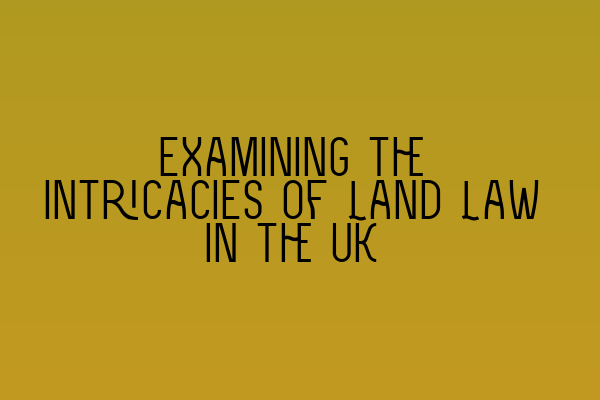Examining the Intricacies of Land Law in the UK
Welcome to another informative blog post brought to you by SQE Property Law & Land Law. In this post, we will dive deep into the intricacies of land law in the UK. Land law is a complex area of legal practice that governs the rights and obligations surrounding the ownership, use, and transfer of land. It plays a crucial role in various legal transactions, such as buying and selling property, leasing agreements, and property development. Understanding the intricacies of land law is essential for both property owners and legal professionals. So, let’s begin our exploration!
1. Types of Property Rights
Land law recognizes different types of property rights that individuals can hold. These rights determine the extent of control and ownership one has over a particular piece of land. The most common property rights in the UK include freehold, leasehold, and commonhold.
The freehold ownership, also known as outright ownership, grants individuals complete control and ownership of the land and any structures on it. This type of ownership is perpetual and can be passed down through generations.
Leasehold ownership is a legal arrangement where an individual holds the right to use a property for a specific period, typically long-term, while the freehold remains with the landowner. The leaseholder pays rent to the landowner and must comply with certain conditions outlined in the lease agreement.
Commonhold ownership is a relatively new concept in the UK and allows multiple individuals to own separate units within a building or development while sharing ownership of common areas. This ownership structure is commonly found in residential blocks and ensures a degree of communal control and management.
2. Transferring Property
The transfer of property, also known as conveyancing, is an essential process in land law. It involves transferring legal ownership from one party to another. The transfer of property requires careful consideration of various legal aspects, such as property searches, title deeds, and financing arrangements.
Understanding Contractual Capacity: Rights and Limitations is an important aspect of property transfer. It ensures that all parties involved in the transaction have the legal capacity and authority to enter into the agreement.
During the property transfer process, it is crucial to conduct thorough searches to identify any potential issues or restrictions on the land. These searches can include checking for registered charges, planning permissions, environmental considerations, and any other relevant factors that may affect the property’s value or use.
3. Restrictive Covenants
Restrictive covenants are legally binding obligations that restrict certain actions or activities on a particular property. They are often put in place to maintain the appearance, value, or character of a specific area or development.
For example, a restrictive covenant may prohibit the construction of certain types of buildings, the use of properties for specific purposes, or modifications to the property’s appearance without prior consent. It is important to understand these covenants when buying a property or considering any alterations to ensure compliance with legal obligations.
If you are interested in testing your knowledge of contract law, don’t miss out on our Interactive SQE Mock Tests for Contract Law: Test Your Knowledge. These mock tests provide valuable insights and help you prepare for the upcoming SQE exam.
4. Easements and Adverse Possession
Easements are rights that allow one party to use another party’s land for a specific purpose. This can include rights of way, access to utilities, drainage, or maintenance obligations. Easements are legally binding and can be granted explicitly or arise through long-standing use or necessity.
Adverse possession, on the other hand, is a legal concept that allows someone who has been in possession of another person’s land for a defined period to claim ownership. This concept is based on the principle that if a person openly occupies and uses land without interference or challenge from the actual owner, they may acquire legal title to the property.
Conclusion
Land law in the UK encompasses a wide range of legal principles and regulations that govern the ownership, use, and transfer of land. Understanding the intricacies of land law is crucial for property owners, legal professionals, and anyone involved in property-related transactions. This blog post has only scratched the surface of this vast subject. To delve deeper into the world of land law, be sure to check out our articles on SQE Contract Law Webinars: Expert Insights and Guidance and Contract Law Reforms: An Analysis of Recent Changes.
